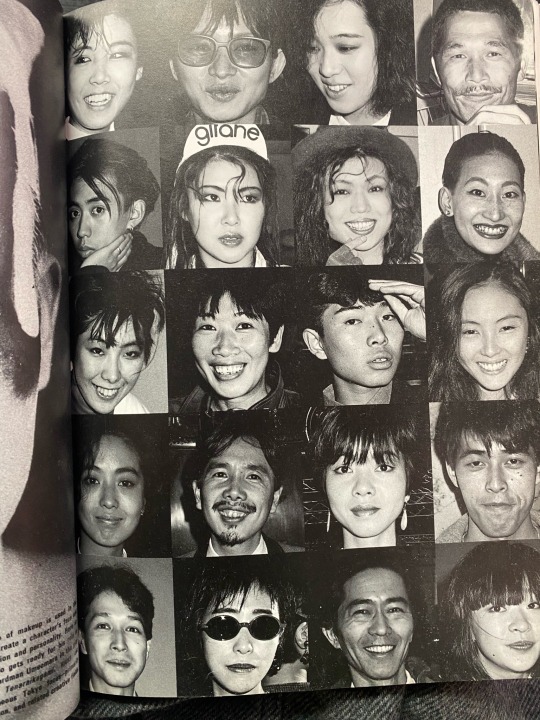#Leonard Koren
Text
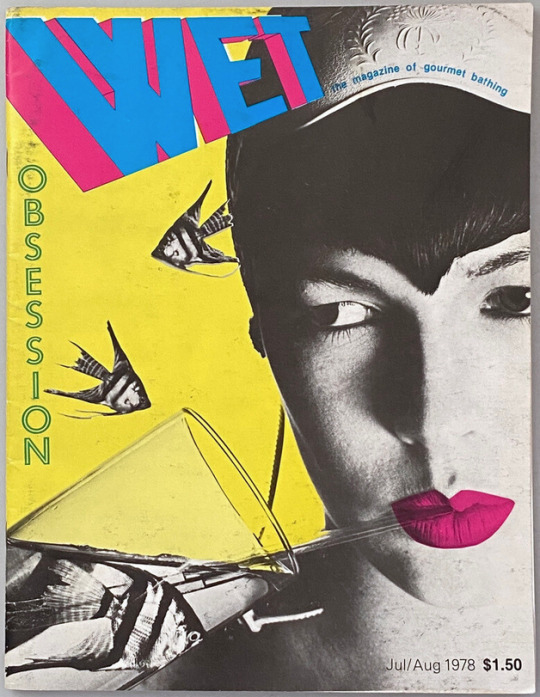




Wet
Published by Leonard Koren (New Fashion Japan, Wabi Sabi etc) WET is the great postmodern achievement in print. A magazine about water. Now more relevant than ever. Can not even begin to explain how much we are indebted to its genius.
IDEA - 101 WARDOUR STREET, London
18 notes
·
View notes
Quote
Wabi-sabi can be called a "comprehensive" aesthetic system. Its world view, or universe, is self-referential. It provides an integrated approach to the ultimate nature of existence (metaphysics), sacred knowledge (spirituality), emotional well-being (state of mind), behavior (morality), and the look and feel of things (materiality). The more systematic and clearly defined the components of an aesthetic system are—the more conceptual handles, the more ways it refers back to fundamentals—the more useful it is.
Leonard Koren, Wabi-Sabi for Artists, Designers, Poets & Philosophers
#quote#Leonard Koren#Koren#wabi-sabi#wabi sabi#aesthetics#Japan#Japanese aesthetics#beauty#philosophy#metaphysics#spirituality#materiality#morality
120 notes
·
View notes
Text

2 notes
·
View notes
Text

“Just as it is important to know when to make choices, it is also important to know when not to make choices: to let things be.”
Leonard Koren
via @matchamatea
94 notes
·
View notes
Photo
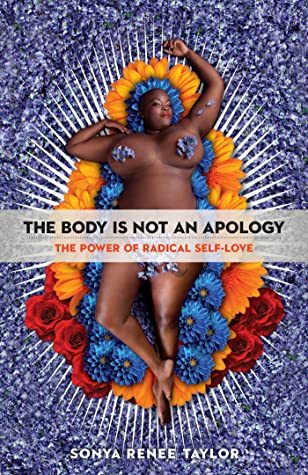
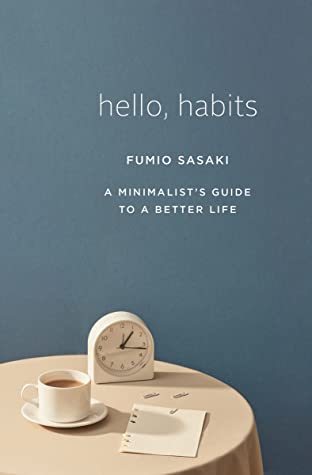


Inspirational Non-Fiction: Self Discovery Titles
The Body Is Not an Apology: The Power of Radical Self-Love by Sonya Renee Taylor
A global movement guided by love.
Humans are a varied and divergent bunch with all manner of beliefs, morals, and bodies. Systems of oppression thrive off our inability to make peace with difference and injure the relationship we have with our own bodies.
The Body Is Not an Apology offers radical self-love as the balm to heal the wounds inflicted by these violent systems. World-renowned activist and poet Sonya Renee Taylor invites us to reconnect with the radical origins of our minds and bodies and celebrate our collective, enduring strength. As we awaken to our own indoctrinated body shame, we feel inspired to awaken others and to interrupt the systems that perpetuate body shame and oppression against all bodies. When we act from this truth on a global scale, we usher in the transformative opportunity of radical self-love, which is the opportunity for a more just, equitable, and compassionate world--for us all.
Hello, Habits: A Minimalist's Guide to a Better Life by Fumio Sasaki, Seiko Yamaguchi (Illustrator), Eriko Sugita (Translator)
The internationally best-selling author of Goodbye, Things shares insights and practices to help you become the best version of yourself.
Fumio Sasaki changed his life when he became a minimalist. But before minimalism could really stick, he had to make it a habit. All of us live our lives based on the habits we’ve formed, from when we get up in the morning, to what we eat and drink, to how likely we are to actually make it to the gym. In Hello, Habits, Sasaki explains how we can acquire the new habits that we want―and get rid of the ones that don’t do us any good.
Bringing together leading theories and tips from cognitive psychology, along with examples from his own life, he unravels common misperceptions about “willpower” and “talent,” and offers a step-by-step guide to success. Ultimately, Sasaki shows how ordinary people like himself can use his principles of good habit-making to improve themselves and change their lives.
Wabi-Sabi: For Artists, Designers, Poets & Philosophers by Leonard Koren
Describes the principles of wabi-sabi, a Japanese aesthetic associated with Japanese tea ceremonies and based on the belief that true beauty comes from imperfection and incompletion, through text and photographs.
The Yin and Yang of Self-Compassion: Cultivating Kindness and Strength in the Face of Difficulty by Kristin Neff
Gentle and Fierce—Two Sides of Self-Compassion That We All Need Now
A vast body of research shows that the skill of self-compassion can deeply calm and heal us. But there's also a fierce "momma bear" side of self-compassion. And all of us—especially women—need it more than ever.
In the face of a threatening or unjust situation, have you ever kept silent because you didn't want to rock the boat or make things worse? And then, did you wonder: "Next time, how can I become stronger and more effective?"
That's the purpose of The Yin and Yang of Self-Compassion. Kristin Neff, PhD, created this inspiring audio program to help you understand and build the two complementary aspects of this crucial skill:
The receptive Yin side self-compassion—how to soothe and comfort yourself when you're in pain and rest in loving, connected presence when alone or with those you care about.
The active Yang side self-compassion—how to see the truth of a situation with courage, protect yourself, and stand strong with others in the face of hostility or harm.
In the years since Kristin Neff and her colleagues first identified the trait of self-compassion, we’ve learned that being kind to ourselves does not weaken us. In fact, just the opposite is true: it makes us more confident, grounded, and resilient amid crisis.
Through fascinating research, stories from Kristin's own experiences as a mother and scientist, and key guided practices, you'll learn how to cultivate the full spectrum of self-compassion—to support yourself and others when it matters the most.
#nonfiction#non-fiction#nonfiction books#to read#tbr#self-help#inspirational#feminism#self help#health#mental health#growth#Reading Recs#reading recommendations#Book Recommendations#book recs#Productivity#Psychology#personal development#how to#philosphy#library books#ebooks#books on hoopla
5 notes
·
View notes
Quote
“Things are either devolving toward, or evolving from, nothingness.”
Leonard Koren
4 notes
·
View notes
Text

From my personal library. New Fashion Japan by Leonard Koren.
2 notes
·
View notes
Text
Shibumi: La Belleza en la Simplicidad y la Complejidad
En el frenético y agitado escenario del mundo moderno, donde la saturación de estímulos y superficialidades es la norma, surge el concepto japonés de Shibumi como una filosofía que nos invita a redescubrir la belleza en la simplicidad y la sofisticación en lo complejo. Shibumi no es solo una palabra, es un universo entero de significado que encapsula una forma de vida que fusiona la estética, el comportamiento y la percepción del mundo.
El Alma de Shibumi
Shibumi es la esencia de una belleza que se revela como sencilla y compleja a la vez, sutil y profunda. Se encuentra en la naturalidad y la espontaneidad, en la perfección de lo imperfecto y la armonía de lo desigual. Como lo describe magistralmente Leonard Koren en su obra "Wabi-Sabi: For Artists, Designers, Poets & Philosophers", Shibumi es "la cualidad estética que es a la vez simple y compleja, sutil y profunda".
La Manifestación de Shibumi
Este concepto se manifiesta en diversas formas de arte japonés, como la ceremonia del té, la jardinería Zen y la caligrafía. En estos expresiones artísticas, la meticulosa atención al detalle y la búsqueda de la perfección se combinan para crear experiencias estéticas y espirituales únicas. Según Betty Edwards en su obra "Drawing on the Right Side of the Brain", Shibumi es "una experiencia estética que es a la vez estimulante y relajante, desafiante y satisfactoria".
Shibumi en la Vida Diaria
Pero Shibumi no se limita al ámbito artístico, es una filosofía que puede impregnar cada aspecto de nuestra vida. Significa vivir con modestia y sin pretensiones, encontrar belleza en las cosas simples, buscar la excelencia en nuestras acciones de manera discreta, sin ostentación. En palabras de Alan Watts en "The Way of Zen", Shibumi es "la belleza de lo ordinario, la elegancia de lo simple".
Un Antídoto Contra el Exceso
En un mundo donde prevalece la obsesión por lo excesivo y llamativo, Shibumi nos invita a simplificar nuestras vidas, a encontrar belleza en la tranquilidad y a apreciar la sutileza en lugar de la ostentación.
Ejemplos Vivientes de Shibumi
- Una taza de té sin adornos, hecha a mano con arcilla simple y apreciada por su funcionalidad y calidez.
- Un jardín Zen con piedras cuidadosamente colocadas, rastrillado de arena y un árbol solitario, que evoca una sensación de paz y armonía.
- Una pintura de caligrafía con tinta negra sobre papel blanco, que expresa la esencia de una idea con trazos simples y elegantes.
Cómo Integrar Shibumi en tu Vida
- Observa ejemplos de Shibumi en tu entorno: en la arquitectura, el diseño, la naturaleza e incluso en las personas.
- Practica Shibumi en tu vida diaria: simplifica tu espacio, aprecia los pequeños detalles y vive con modestia y autenticidad.
- Aprende más sobre Shibumi: lee libros, artículos y mira videos sobre este tema fascinante.
Shibumi nos recuerda que la verdadera belleza reside en la simplicidad, la modestia y la armonía con nuestro entorno. Nos invita a vivir con gracia y elegancia, y a descubrir la perfección en lo simple y lo complejo.
Citas para Reflexionar
- Haruki Murakami: "La belleza no es algo que se pueda poseer. Es algo que se experimenta."
- Yasunari Kawabata: "Lo esencial es invisible a los ojos."
- Jiro Ono: "La simplicidad es la clave de la verdadera elegancia."
0 notes
Text
READING LIST
1. Perks of being a wallflower, Stephen Chbosky, 1999
2. Prozac nation, Elizabeth Wurtzel, 1994
3. After dark, Haruki Murakami, 2004
4. The interpretation of dreams, Sigmund Freud, 1899
5. The trial, franz kafka, 1925
6. The stranger/the outsider, Albert Camus, 1942
7. Crime & punishment, Fyodor Dostoevsky, 1866
8. Wabi Sabi, Leonard Koren, 2008
9. The bell jar, Sylvia Plath, 1963
10. 1984, George Orwell ,1949
11. Animal farm, George Orwel, 1945
12. Lolita, Vladimir Nabokov, 1955
13. Dracula, Bram Stoker, 1897
14. Fight club, Chuck Palahniuk., 1996
15. Americal psycho, Bret Easton, 1991
16. The catcher in the rye, J. D. Salinge, 1951
17. No longer human, Osamu Dazai, 1948
18. Kafka on the shoe, Haruki Murakami, 2002
19. The great Gatsby, F. Scott Fitzgerald, 1925
20. Diary of an oxygen thief, Anonymous, 2006
21. The little prince, Antoine de Saint-Exupéry, 1943
22. Lord of the flies, William Golding, 1954
23. All quiet on the western front Erich Maria Remarque, 1928
being getting into reading again lately so thought I'd share my reading list
1 note
·
View note
Photo

Illustration: Margaret Wynn
Logo: Jim Deesing
Photography: Jules Bates
Design/AD: Elizabeth Freeman, Leonard Koren, and Margaret Wynn
0 notes
Link
0 notes
Text
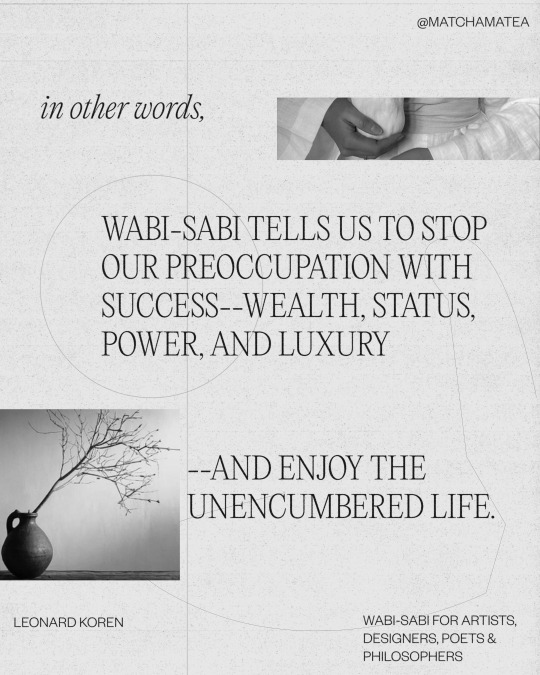
“In other words, wabi-sabi tells us to stop our preoccupation with success--wealth, status, power, and luxury--and enjoy the unencumbered life.” - Leonard Koren
via @matchamatea
#matchamatea#quote#wabi sabi#aesthetics#minimalism#beige aesthetic#inspo#inspiring quotes#quoteoftheday
29 notes
·
View notes
Text
Get rid of all that is unnecessary. Wabi-sabi means treading lightly on the planet and knowing how to appreciate whatever is encountered, no matter how trifling...
Wabi-sabi is exactly about the delicate balance between the pleasure we get from things and the pleasure we get from freedom of things.
– Leonard Koren, Wabi-Sabi: For Artists, Designers, Poets & Philosophers
0 notes

